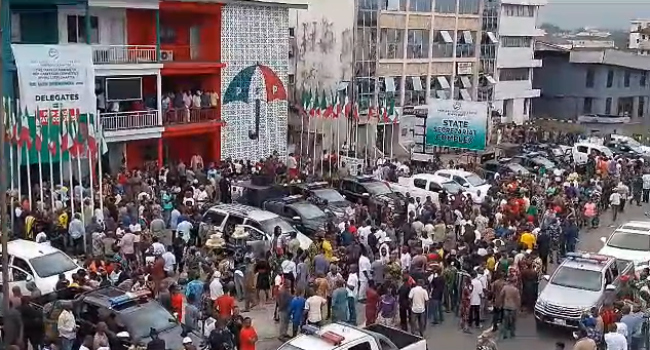On Thursday, supporters of the Peoples Democratic Party (PDP) in Rivers State organized a large-scale protest against impending local government elections planned for October 5, under the supervision of the Rivers State Independent Electoral Commission (RSIEC). The demonstration was led by PDP state chairman Chukwuemeka Aaron and saw thousands of party loyalists marching through Port Harcourt, undeterred by inclement weather conditions. Prominent figures from within the party, including former local government chairpersons from various regions, participated in the protest, which highlighted their discontent with the scheduled elections and raised concerns over the electoral process.
The protesters gathered at the PDP secretariat early in the morning, wielding placards that expressed their grievances. Following their assembly, they proceeded to the Department of State Services office to voice their complaints formally. During their demonstration, a representative from the DSS addressed the crowd, who then continued their march toward the State Police Command Headquarters. The protesters chanted slogans expressing their unwavering support for Nyesom Wike, the Minister of the Federal Capital Territory, and conveyed their opposition to the electoral process, emphasizing their demands via placards that featured messages such as “RSIEC obey court order” and “Rivers State is not lawless.”
At the police headquarters, the turnout of protesters increased, prompting police officials to hold brief discussions with the protest’s leadership. The atmosphere of the protest remained spirited, characterized by chants reinforcing support for Wike, and the eventual dispersal of the crowd was accompanied by songs that fostered solidarity among the demonstrators. The protest highlighted internal tensions within the party and reflected a broader sentiment among grassroots supporters regarding electoral legitimacy in the state.
Amid these developments, significant political maneuvering was evident as factions within the PDP expressed dissent, particularly the faction aligned with Wike, which had previously announced its withdrawal from the local government elections. This faction alleged irregularities and shortcomings in the procedural conduct of the RSIEC, which they argued compromised the integrity of the elections. Conversely, the faction of the All Progressives Congress (APC) under Emeka Beke, loyal to former Minister of Transportation Rotimi Amaechi, showed readiness to participate in the elections, having handed out party flags to candidates across 22 local government areas, thus indicating a stark division in political strategies between the two parties.
The clash in electoral strategies between the PDP and the APC intensified as accusations exchanged between the RSIEC and the Independent National Electoral Commission (INEC) regarding the voter registration process. INEC refuted claims made by RSIEC about the availability of the 2023 voter register for the upcoming elections, raising questions about the preparedness of the electoral process and the legitimacy of the voter rolls being employed. The tensions underscored the fraught relationship between various electoral bodies and the implications for the conduct of fair elections within the region.
In a decisive move to facilitate voter participation, Governor Siminalayi Fubara addressed the state with a proclamation declaring Thursday and Friday as public holidays. This initiative aimed at encouraging voters to return to their local government areas for the elections was accompanied by resolute statements from the governor, asserting that neither protests nor propaganda would derail the electoral proceedings. His remarks underscored a fortified stance toward the elections, suggesting that the government remains committed to ensuring that the electoral process unfolds as scheduled, irrespective of opposition or grievances voiced by dissenting factions.
In summary, the opposition from the PDP regarding the local government elections serves as a critical lens through which the political dynamics of Rivers State can be understood. The protests, coupled with internal party conflicts and external electoral disputes, reveal a complex and contentious political landscape. The government’s insistence on proceeding with the elections, alongside the emerging divisions within opposing parties, will likely play a pivotal role in shaping the future political trajectory of Rivers State as the contentious election date approaches.


